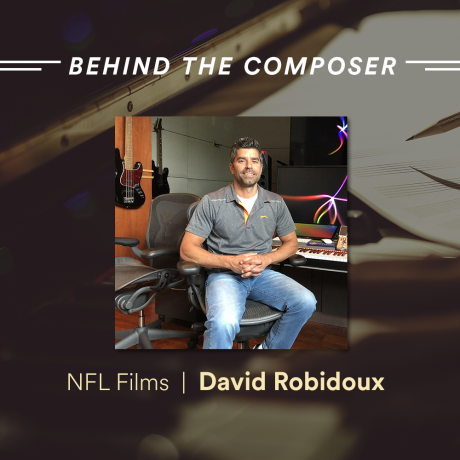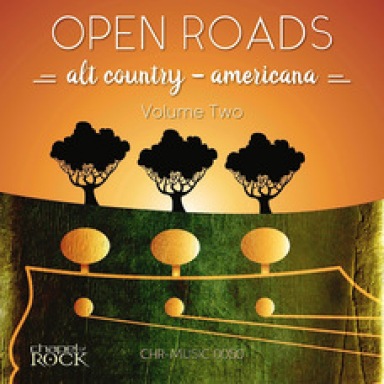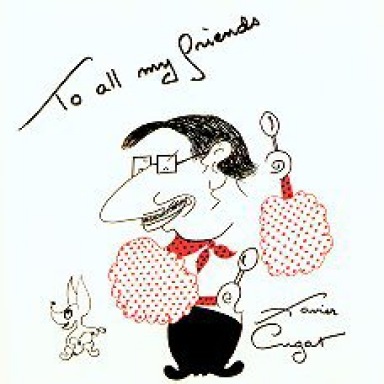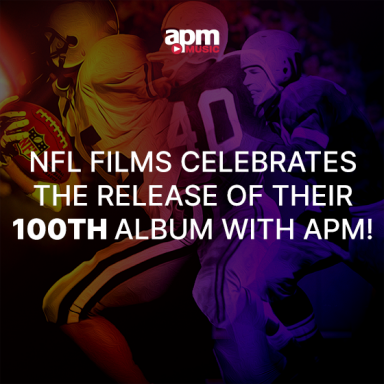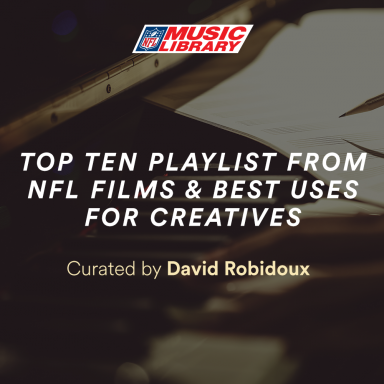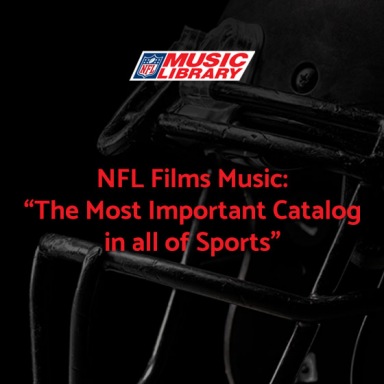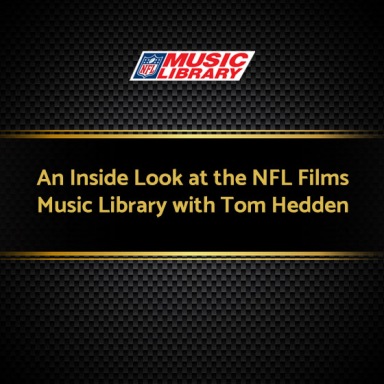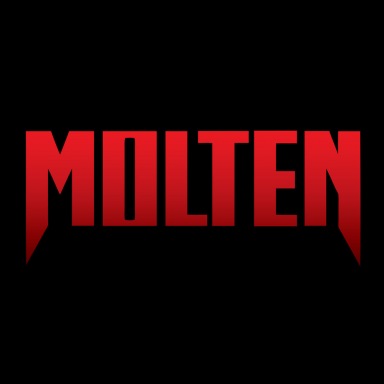Behind the Composer: David Robidoux - NFL Films
Written by Todd Grasley
The Vince Lombardi Trophy is one of the most iconic in all sports, given out to the winning team in the NFL Championship Game, the Super Bowl. A trophy that embodies success, passion, and hard work, much like the musical composition that proceeds the award presentation.
The man behind that piece is a true legend in the sports musical world, David Robidoux, often considered the greatest of this generation, the Tom Brady of the music industry. In his career, Robidoux has won numerous Emmy Awards for TV and film and has written over 60 national TV opening themes, and over 4,000 compositions across TV and film.
Over three decades with NFL films, he has written openings for Hard Knocks (HBO) and official themes and branding scores for the National Football League, The Lombardi Trophy Super Bowl Theme, Pro Football Hall of Fame, Thursday Night Football theme, and countless others.
We look at Robidoux's journey from a young child in Pennsylvania who loved music at an early age to his first few months on the job at NFL Films, and how he’s worked on some of the most impactful and recognizable musical pieces in the sports world.
MUSICAL CHILDHOOD
David Robidoux didn’t grow up in a musical family, but music was all around him. A child of the 80’s music was everywhere. On the radio, at the movies, or hanging out at the mall, he could not escape it, and at seven years old he began guitar lessons then quickly drums and bass.
“I was lucky because my guitar teacher, Gene Bujnovsky, was a Master of Jazz guitar and didn’t just teach me how to play, but also taught me all the theory of jazz, really advanced things. A lot of people have had an impact on my musical development, but he had the most direct impact than anyone else.”
Despite, the focus on jazz, at 11 years old Robidoux began to play in a rock band with his music-obsessed friends. The passion continued to burn as he entered high school, whereas as a sophomore he got a 4-track cassette recorder and started experimenting with writing original pieces. His obsession with a broad range of music from The Police to Van Halen, ZZ Top, and Michael Jackson, opened his eyes to a whole other side of music.
“Being new to it all, the initial ideas I was coming up with were terrible, really bad, but it allowed me to create my own music, instead of just performing other people’s music,” he said.”
Also, during this time, his high school had a program where any student that was interested in music as a possible career, could spend the second half of the day in concentrated music studies with the Band and Choral teachers.
NEW INSPIRATION: FILM SCORING
Robidoux rose to the occasion at the prestigious Berklee College of Music. Due to his high school music courses and what he had learned from his guitar teacher, he was put in second-year classes and thrust into topics like advanced theory and composition classes with his Jazz Composition major. The theory side of music, the atonal writing, and dense harmonic writing quickly took a toll on the youngster.
“It wasn’t inspiring me,” he noted. “I felt like composing had started to be more like math and was losing the emotion for me. At some point that first year, I remember waking up and thinking Film Scoring is the perfect major for me because the sole purpose of the music is to be emotional at its core.”
He thought back to his younger days, a fan of movie scores like Star Wars and Back to the Future. For Robidoux, it was all about the hook and creating those memories.
"As a kid, I was just as much a fan of movie scores like Star Wars and Back to the Future as I was of the 80s rock and pop. To me, it was all about the catchy hook. The Back to the Future melody is just as memorable as 'Roxanne' by the Police. I quickly changed from Jazz Composition to the Film Scoring major and kept the Dual Degree with Music Production & Engineering. It really ignited me creatively and felt really natural to write for a picture,” he said.
OPENING DOORS
When Robidoux graduated from Berklee in May of 1991 he had a job at a post-production house called Editel in Boston. He assisted on the engineering side and was always in awe of the house composer that would write the music for the commercials, while he would help the engineer that recorded his music.
“I always thought to myself, what a lucky guy that he gets to come in each day and gets paid to compose music,” he said. “I knew that’s what I wanted to do. I just knew it would probably take a long time to get there and I’d probably have to move to LA at some point.”
That opportunity came sooner than expected. In June of 1991, a former professor Robin Coxe-Yeldham, contacted him and told him of an internship at NFL Films in the audio department. While she added that he’d be a perfect fit, something was holding Robidoux back from calling.
“I was a fan of NFL Films programming growing up because I lived near Philadelphia and that’s where they were located,” he said. “However, I thought it was a bunch of 60-year-old guys sitting around editing movies on an old Moviola machine and I wouldn’t fit in at all.”
That preconceived notion quickly changed when Robidoux was flipping through one of his monthly audio engineer magazines and he read the article about Studio A at NFL Films. He couldn’t believe NFL Films had a facility that looked like that.
It was a sign. A sign of one of the most influential decisions in his life. He called to see if the internship was still open, and it was. Robidoux drove down to interview Jerry Mahler, the head of audio at the time, who told him that while the internship was unpaid if he was able to prove himself, it may lead to a full-time assistant engineer position.
“He also said I could come in and use the studio anytime there wasn’t a session. Beyond the internship opportunity, the free studio time sold me on the job, and I took the internship,” Robidoux noted.
That intuition proved valuable. When Robidoux returned to Boston to inform Editel, a note on the door said they consolidated offices and that his location had now been closed. Nobody had jobs anymore.
“I felt like it was fate,” he said. “At that point, I figured I’d try my hardest during the NFL Films internship so I could get the job, get a lot of experience and maybe stay for a couple of years and then try LA.
INTRODUCTION TO NFL FILMS
Early on in his internship at NFL Films, Robidoux formed a bond with another newcomer, Tom Hedden, who started about nine months prior in the music department as well. Their common goal to write music was apparent. While Hedden was editing music all day, he was assisting in the studio. On the side, both were writing for little projects for a couple of producers.
“I was still an intern when we wrote some pieces for the start of the ‘91 season,” Robidoux explained. “It was tough in the beginning, earning the trust of filmmakers is not easy. It’s their project and your job is to help them realize their vision, they’re not always open to new collaborators.”
There was no scheme, no grand plan, between Hedden and Robidoux. No mapping out the next five, ten, or even twenty years. The progression, much like their music, came gradually, and naturally.
“We just loved what we were doing and it took a lot of work because both of us were still responsible for other jobs during the day,” Robidoux said. “The trust of the filmmakers began to come.”
With the trust of filmmakers, Robidoux had begun to hit his stride. He stopped being a Post-Audio Mixer and made the move into the music department with Hedden where they began to write even more music together at the request of the producers. The workload increased rapidly, and the pair quickly saw their music editing jobs fade so they could compose full-time.
“This was a monumental change for us and it coincided with us beginning to go to London to record the orchestra,” he said. “Scott Smalley, who had orchestrated our music, had been pushing us to go to London because of the sound. I think the pressure of being full-time composers and the intimidation of London really pushed both of us to write our best stuff up to that point.”
Not only did the sound of their music hold up to Hollywood, their writing was getting a lot better as well, and it came with a different sound than earlier NFL Films Music, but Robidoux knew one thing was consistent, the main ingredient was the same as any rock or pop tune from the ’80s, a catchy melody right out front.
“I think growing up in the ’80s really helped me retain that important part of NFL Films music but also adding my own sound to it,” he added. “It really helped solidify the new NFL Films sound going forward.”
ESTABLISHING CREATIVE FREEDOM
It’s a sound that Robidoux has been crafting and perfecting for the last three decades, a sound that is synonymous with the highest industry standards and excellence. In a career that spans over thirty years at NFL Films, he has composed some of the most iconic pieces including the Hard Knocks Theme and Lombardi Trophy Theme.
“Honestly, it’s 90 percent luck that I got the call from my teacher Robin, picked up the Audio magazine, Jerry Mahler hired me, and Tom and I started writing,” he said. “You think it would all end there, but it all took place in a really amazing company founded by Ed and Steve Sabol. They created the ultimate thing in the entertainment industry, the thing everyone wishes they had, creative freedom.”
That freedom is what propelled Robidoux in his career. He wasn't brought into the process at the end to add music. He was in the room along with Hedden as the filmmakers were at the beginning stages of the film. Those projects, where the filmmakers said go and write whatever you feel, were his most gratifying, and one of those was HBO’s Hard Knocks.
“We had never really done a show like Hard Knocks and never a show so focused on training camp,” he explained. “To me, it was inspiring because I had the challenge of what does training camp music sound like, how is it different than the music for the season and the Super Bowl? It wasn’t a long-drawn-out process, I narrowed it down to two ideas that I composed and played for Steve and two other producers, and they knew right away which one was it and that became the Hard Knocks Theme and the basis for the series’ music.”
The Lombardi Trophy Theme was a similar situation. Frank Supovitz who came to the NFL from the NHL felt the Super Bowl and the Lombardi Trophy needed to have a presentation and a theme like the Olympics. Robidoux met with Steve Sabol and Supovitz for about three minutes, with one “simple” instruction, go write something as catchy and memorable as the Olympic theme and Star Wars.
“I didn’t come close, but I think it pushed me to capture the prior 40 years of NFL Films music to give it a unique signature only the NFL is known for,” he said. “I wrote many ideas but only presented Steve and Frank with one. They loved it and didn’t make one change. The first and only time that’s ever happened to me writing a major theme!”
HISTORIC COMPOSITION: NFL 100th ANNIVERSARY THEME
David Robidoux was there when the NFL hit 75 seasons and 25 years later, he was at the forefront of the league’s 100th anniversary composing the 100th Anniversary Theme. While he considered it an honor, he also considered it intimidating musically.
“You’re excited about the amazing opportunity and then very quickly it sets in how difficult it is to come up with these types of themes,” he said. “It’s paralyzing for a composer; you sit in front of your keyboard for days just thinking of the expectations and pressure to create something unique and memorable.”
Eventually, those expectations faded and the shift to keep working took over. While most of the big themes Robidoux had written in the past allowed him to complete creative freedom, the 100th Anniversary theme was different with 20-30 people weighing in on different aspects of the theme.
“That’s always what makes it very difficult, but I’m really honored and humbled because there are so many incredible composers out there who would love this opportunity,” he said.
PASSING THE TORCH: LEARNING FROM SABOL AND SPENCE
It’s an opportunity that has won him numerous awards over the last three decades and cemented his place in history among his predecessors Ed and Steve Sabol and Sam Spence.
“Steve always used to say we need ‘spectacular failures,’ we need bold ideas,” he noted. “If you play it safe, viewers won’t stick around. Steve was the creative genius behind everything, he meant a lot to me.”
Sabol never once asked Robidoux to try and be something else musically and embraced his uniqueness. That trust was evident with a long rope handed down, a passing of the torch.
“I really connected with Steve and how he heard NFL Films music,” he added. “I understood what he accomplished with Sam Spence, and I knew he didn’t want me to be Sam because he did that already. I think he trusted that I really understood what NFL Films is all about. It’s about telling human stories; they just happen to be set to the backdrop of football.”
Check out Dave Robidoux's music and the NFL Films library on APM Music here.
►Subscribe to our newsletter to receive weekly Music Director Picks in your inbox!

